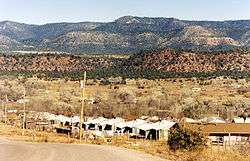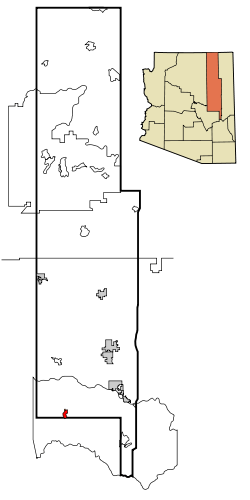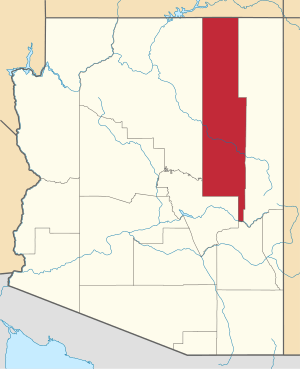Cibecue, Arizona
Cibecue (Western Apache: Dishchiiʼ Bikoh "Horizontally Red Valley/Canyon") is a census-designated place (CDP) in Navajo County, Arizona, United States, on the Fort Apache Indian Reservation. The population was 1713 in the 2010 United States Census.
Cibecue, Arizona | |
|---|---|
 View of Cibecue | |
 Location in the Fort Apache Indian Reservation, Navajo County, and the state of Arizona | |
 Cibecue, Arizona Location in Arizona  Cibecue, Arizona Location in United States | |
| Coordinates: 34°02′23″N 110°29′08″W | |
| Country | United States |
| State | Arizona |
| County | Navajo |
| Area | |
| • Total | 5.97 sq mi (15.47 km2) |
| • Land | 5.97 sq mi (15.46 km2) |
| • Water | 0.00 sq mi (0.00 km2) |
| Elevation | 4,920 ft (1,500 m) |
| Population (2010) | |
| • Total | 1,713 |
| • Estimate (2016)[2] | N/A |
| Time zone | UTC-7 (MST) |
| ZIP code | 85911 |
| Area code(s) | 928 |
| FIPS code | 04-13400 |
| GNIS feature ID | 2921 |
The current council leaders are Arnold Beach Sr. and Tony Alsenay.[3]
The Cibecue community has a high unemployment rate, which was exacerbated by the Rodeo–Chediski Fire, Arizona's second-largest wildfire in recorded history. The main employer for the community is the Dishchii' Bikoh Community School.
Geography
Cibecue is located at 34°2′23″N 110°29′8″W (34.039644, -110.485435).[4]
According to the United States Census Bureau, the CDP has a total area of 6.0 square miles (16 km2), all land.
Demographics
| Historical population | |||
|---|---|---|---|
| Census | Pop. | %± | |
| 2000 | 1,331 | — | |
| 2010 | 1,713 | 28.7% | |
| U.S. Decennial Census[5] | |||
| Languages (2000) [6] | Percent |
|---|---|
| Spoke Apache at home | 87.24% |
| Spoke English at home | 12.76% |
As of the census[7] of 2000, there were 1,331 people, 323 households, and 268 families residing in the CDP. The population density was 223.1 people per square mile (86.1/km2). There were 344 housing units at an average density of 57.7/sq mi (22.2/km2). The racial makeup of the CDP was 96.02% Native American, 2.63% White, 0.08% Black or African American, 0.15% Asian, 0.23% from other races, and 0.90% from two or more races. 2.03% of the population were Hispanic or Latino of any race.
There were 323 households, out of which 54.8% had children under the age of 18 living with them, 41.8% were married couples living together, 34.1% had a female householder with no husband present, and 17.0% were non-families. 13.6% of all households were made up of individuals, and 2.8% had someone living alone who was 65 years of age or older. The average household size was 4.11 and the average family size was 4.45.
In the CDP, the population was spread out, with 45.2% under the age of 18, 10.6% from 18 to 24, 25.9% from 25 to 44, 13.7% from 45 to 64, and 4.7% who were 65 years of age or older. The median age was 21 years. For every 100 females, there were 96.6 males. For every 100 females age 18 and over, there were 93.1 males.
The median income for a household in the CDP was $12,286, and the median income for a family was $13,750. Males had a median income of $52,639 versus $21,591 for females. The per capita income for the CDP was $5,941. About 55.7% of families and 68.7% of the population were below the poverty line, including 72.5% of those under age 18 and 70.9% of those age 65 or over.
In 2010, Cibecue had the 18th-lowest median household income of all places in the United States with a population over 1,000.[8]
Transportation
Cibecue Airport is a public use general aviation airport located four nautical miles (7 km) southeast of the central business district of Cibecue.[9]
The White Mountain Apache Tribe operates the Fort Apache Connection Transit, which provides local bus service. [10]
Education
The area is served by the Whiteriver Unified School District and the Dishchii' Bikoh Community School .
Media
Cibecue is the focus of the seminal ethnography by Keith H. Basso entitled "Portraits of the 'Whiteman': Linguistic play and cultural symbols among the Western Apache" (1979).
References
- "2016 U.S. Gazetteer Files". United States Census Bureau. Retrieved Jul 18, 2017.
- "Population and Housing Unit Estimates". Retrieved June 9, 2017.
- "Tribal Council". WMAT. Retrieved 2012-09-15.
- "US Gazetteer files: 2010, 2000, and 1990". United States Census Bureau. 2011-02-12. Retrieved 2011-04-23.
- "Census of Population and Housing". Census.gov. Retrieved June 4, 2016.
- "Archived copy". Archived from the original on 2017-05-25. Retrieved 2017-03-24.CS1 maint: archived copy as title (link)
- "U.S. Census website". United States Census Bureau. Retrieved 2008-01-31.
- "US Census". Archived from the original on 12 February 2020. Retrieved 18 January 2014.
- FAA Airport Master Record for Z95 (Form 5010 PDF). Federal Aviation Administration. Effective November 15, 2012.
- "Tribal Transportation". WMAT DOT. Retrieved 2020-02-03.
